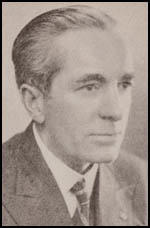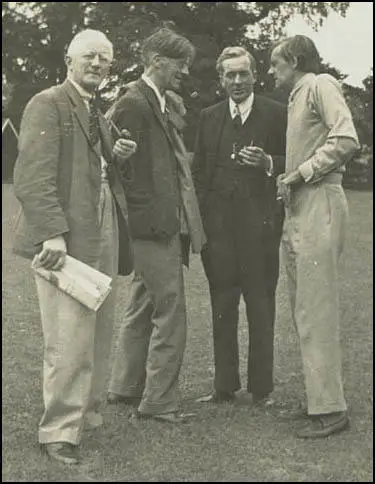John McNair

John McNair was born in Boston, Lincolnshire, in October 1887. He left school at thirteen and worked as an errand boy. McNair became a socialist and joined the Independent Labour Party (ILP). In the 1910 General Election he took part in the campaign to elect Victor Grayson at Colne Valley. (1)
Blacklisted for his political activities in England he found it difficult to find work and decided to move to Paris. (2) He returned in 1923 and was appointed as London's Organising Secretary for the ILP in the 1924 General Election. (3)
After the election he moved back to France. According to one source he became "a leather merchant, founding a French football club with eight teams, and lecturing on English poets at the Sorbonne." (4)
Spanish Civil War
The Spanish Civil War began on 18th July, 1936. McNair attempted to recruit soldiers to fight for the Popular Front Government. McNair worked alongside William Gallacher of the Communist Party of Great Britain (CPGB). "I had three meetings in Fife which, the local comrades were good enough to tell me, were successful, but there was a strong Catholic opposition... Gallacher's meetings in the constituency were broken up by the Catholics." (5)
McNair went to Barcelona to run the ILP's political office. The ILP was affiliated with Workers Party of Marxist Unification (POUM), an anti-Stalinist organisation formed by Andres Nin and Joaquin Maurin. As a result of an ILP fundraising campaign in England, the POUM had received almost £10,000, as well as an ambulance and a planeload of medical supplies. (6)
In December 1936 McNair met George Orwell who had been sent from London by Fenner Brockway and Henry Noel Brailsford. It has been pointed out by D. J. Taylor, that McNair was "initially wary of the tall ex-public school boy with the drawling upper-class accent". (7)
McNair later recalled: "At first his accent repelled my Tyneside prejudices... He handed me his two letters, one from Fenner Brockway, the other from H.N. Brailsford, both personal friends of mine. I realised that my visitor was none other than George Orwell, two of whose books I had read and greatly admired." Orwell told McNair: "I have come to Spain to join the militia to fight against Fascism". Orwell told him that he was also interested in writing about the "situation and endeavour to stir working-class opinion in Britain and France." (8) Orwell talked about producing a couple of articles for The New Statesman. (9)
Joseph Stalin appointed Alexander Orlov as the Soviet Politburo adviser to the Popular Front government. Orlov and his NKVD agents had the unofficial task of eliminating the supporters of Leon Trotsky fighting for the Republican Army and the International Brigades. This included the arrest and execution of leaders of POUM, National Confederation of Trabajo (CNT) and the Federación Anarquista Ibérica (FAI).
Edvard Radzinsky, the author of Stalin (1996) has pointed out: "Stalin had a secret and extremely important aim in Spain: to eliminate the supporters of Trotsky who had gathered from all over the world to fight for the Spanish revolution. NKVD men, and Comintern agents loyal to Stalin, accused the Trotskyists of espionage and ruthlessly executed them." (10)
John McNair was identified by the NKVD as a supporter of POUM and attempted to arrest him. McNair was now in danger of being murdered by communists in the Republican Army. With the help of the British Consul in Barcelona, McNair, his secretary, Eileen O'Shaughnessy, George Orwell and Stafford Cottman, were able to escape to France on 23rd June, 1937. (11) The first newspaper McNair saw at the station contained a report saying that he had been arrested for espionage. (12)

McNair's assistant, Bob Smillie, was arrested by the police. McNair campaigned for his release but he died in June, 1937. McNair investigated his death as he believed he had been murdered. According to David Murray this was untrue: "The opinions which are widely current that Robert Smillie was arrested due to a suspected connection with secret conspiracies and planned outrages is quite unfounded. Accusations that the prisoner was ill treated and finally shot are completely untrue." (13)
Georges Kopp, Smillie's commander in Spain, also believed that Smillie had been murdered: "The doctor states that Bob Smillie had the skin and the flesh of his skin perforated by a powerful kick delivered by a foot shod in the nailed boot; the intestines were partly hanging outside. Another blow had severed the left side connection between the jaw and the skull and the former was merely hanging on the right side. Bob died about 30 minutes after reaching the hospital." (14)
General Secretary of the ILP
On 14th September, 1938, The Daily Worker, published a statement from F. A. Frankford, claiming that the the ILP and POUM were working in secret with the Nationalist Army. John McNair attacked Frankford in the New Leader. Frankford later admitted he "had been imprisoned in Barcelona and presented with the documents to sign as a condition of freedom." (15)
McNair was elected as General Secretary of the Independent Labour Party (ILP) and was its candidate in the Bristol Central by-election in 1943, taking 7.3% of the vote. He also wrote the official biography of James Maxton, entitled James Maxton: The Beloved Rebel (1955). He also completed a degree at the University of Durham. (16)
John McNair died on 18th February, 1968.
Primary Sources
(1) John McNair, George Orwell: The Man I Knew (March, 1965)
A moment later Orwell followed him in. He drawled in a distinctly bourgeois accent, "I'm looking for a chap named McNair, I've got a couple of letters for him." At first his accent repelled my Tyneside prejudices and I curtly replied, "I'am the lad ye're looking for." He handed me his two letters, one from Fenner Brockway, the other from H.N. Brailsford, both personal friends of mine. I realised that my visitor was none other than George Orwell, two of whose books I had read and greatly admired.... I asked him what I could do to help and he replied, "I have come to Spain to join the militia to fight against Fascism." I asked him if he had ever been a soldier and he mentioned that he had been a police officer in Burma and could handle a rifle. I told him that I remembered this from Burmese Days. For the first time he smiled and the atmosphere became friendly....
He took careful note of my description of the militia bodies and then added that he would like to write about the situation and endeavour to stir workingclass opinion in Britain and France. I suggested the best thing he could do would be to use my office as his headquarters, get the atmosphere by going to Madrid, Valencia, and the Aragon front where the P.O.U.M. forces were stationed and then get down to the writing of his book. He then said that this was quite secondary and his main reason for coming was to fight against Fascism.
